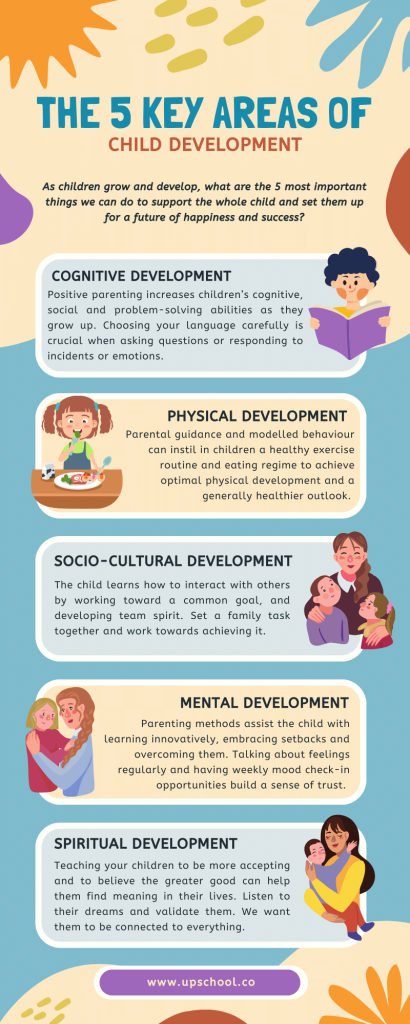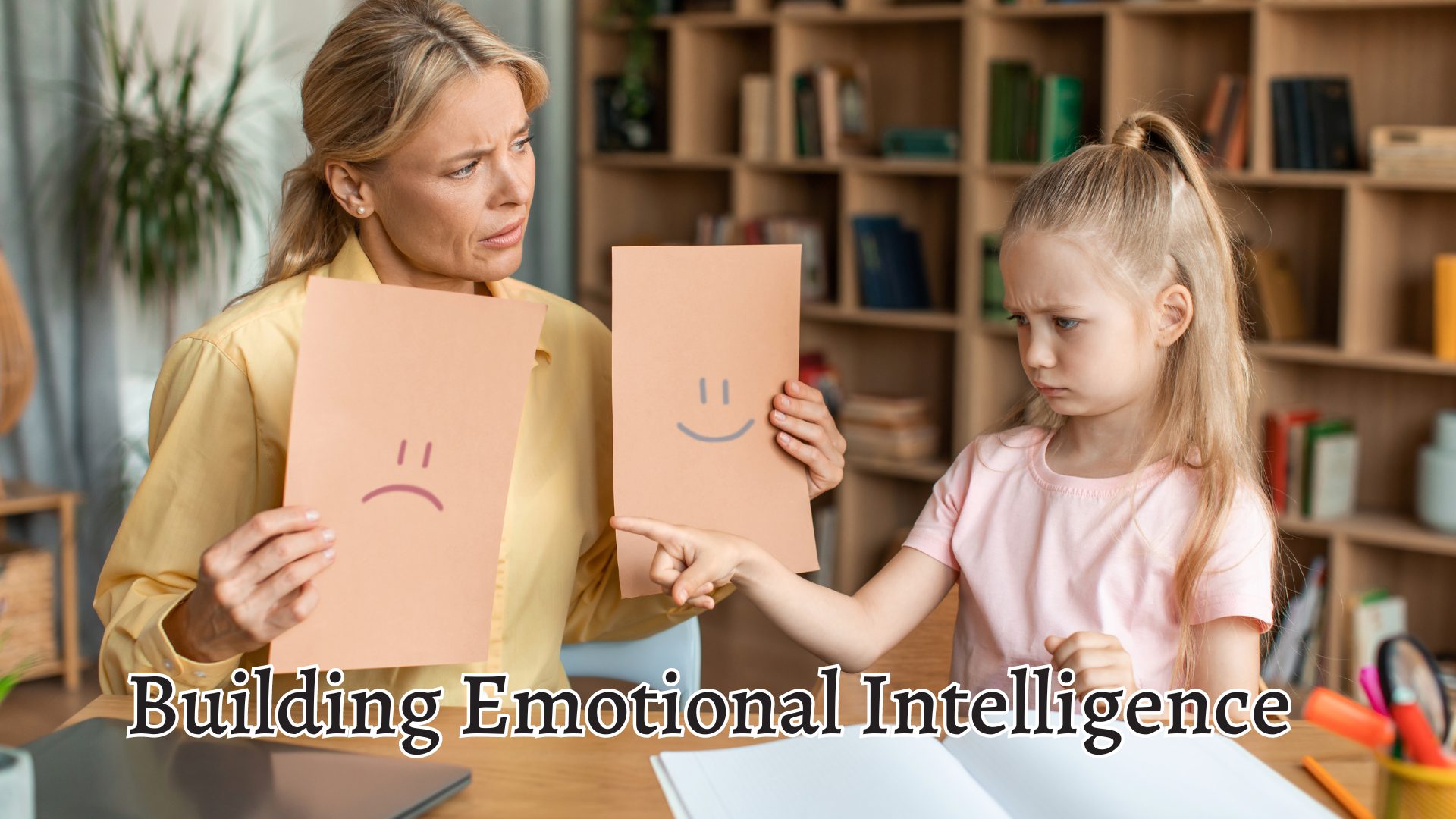Latest From Upschool
- Building Emotional Intelligence
- Understanding Milestones
- How To Raise Successful Kids – Without Over Parenting: Julie Lythcott Haims
- 5 Ways To Share Math With Kids: Dan Finkel
- Parenting In The Digital Age: Sonia Livingstone
- Building Your Childs Self Esteem
- What Should I Be Reading With My Child?
- The Power of Believing That You Can Improve: Carol Dweck
-
-
No videos yet!
Click on "Watch later" to put videos here
- View all videos
-
-
-
Don't miss new videos
Sign in to see updates from your favourite channels
-
Guest Contributors
Health & Wellbeing (Guest Contributors)
The 5 Key Areas of Child Development

Published by: Digital Schools
As children grow and develop, we often ask ourselves what are the most important things we can do to support the whole child and set them up for a future of happiness and success.
This infographic will help you to understand the fundamental areas of child development, but also assist you with strategies in which you can optimise the opportunity to develop your children in these five key areas.
 Here is some more information on each area:
Cognitive Development
Cognitive development refers to the mental processes involved in learning, thinking, problem-solving, and memory. It involves the acquisition of knowledge, skills, and understanding about the world around us. Cognitive development begins at birth and continues throughout childhood and adolescence, with significant changes occurring during different stages of development. Early experiences, such as sensory stimulation, language exposure, and social interaction, play a vital role in shaping cognitive development. Parents and caregivers can support cognitive development by providing a safe and stimulating environment, encouraging exploration and curiosity, and engaging in meaningful conversations and activities.
Physical Development
Physical development refers to the growth and maturation of the body and its organs, including motor skills, coordination, and physical fitness. It involves both gross motor skills, such as running, jumping, and climbing, and fine motor skills, such as writing, drawing, and manipulating objects. Physical development is crucial for a child’s overall health and wellbeing, as it enables them to explore their environment, engage in play, and develop independence. Adequate nutrition, sleep, and exercise are essential for physical development, as well as regular check-ups with healthcare professionals to monitor growth and development.
Socio-cultural Development
Socio-cultural development refers to the learning of social norms, cultural values, and customs, and the development of identity and self-concept. It involves the acquisition of knowledge, attitudes, and beliefs that shape social behavior and interactions. Socio-cultural development begins at birth, with children learning about their cultural and social background through their families and communities. As children grow and enter school, they encounter different cultural practices and traditions, which can be challenging to navigate. Parents and caregivers can support socio-cultural development by exposing children to diverse cultures, celebrating cultural traditions, and teaching children about diversity and inclusivity. Developing socio-cultural awareness and competence helps children to respect and appreciate cultural differences, build empathy and understanding, and develop positive social relationships with others.
Mental Development
Mental (or emotional) development refers to the ability to understand and regulate emotions, express feelings, and form relationships with others. It involves the development of self-awareness, empathy, and emotional resilience, which are critical skills for mental health and wellbeing. Mental development begins in infancy, with the attachment between infants and their caregivers playing a crucial role in shaping emotional development. As children grow and experience different emotions, they learn to manage their feelings, cope with stress, and form positive relationships with others. Parents and caregivers can support children by providing a safe and supportive environment, modeling healthy emotional expression, and teaching children emotional regulation skills.
Spiritual Development
Spiritual development refers to the search for meaning, purpose, and connection with something greater than oneself. It involves the development of values, beliefs, and ethical principles that guide behaviour and decision-making. Children can begin to explore spiritual development at a young age through their curiosity about the world, their questions about life and death, and their experiences of wonder and awe. Parents and caregivers can support spiritual development by creating opportunities for reflection, exploring different traditions and beliefs, and modeling ethical and moral behavior. Developing spiritual awareness helps children to develop a sense of purpose and meaning in their lives, build resilience and coping skills, and form a sense of connection and belonging with others and the world around them.
More posts like this on upschool.co
Here is some more information on each area:
Cognitive Development
Cognitive development refers to the mental processes involved in learning, thinking, problem-solving, and memory. It involves the acquisition of knowledge, skills, and understanding about the world around us. Cognitive development begins at birth and continues throughout childhood and adolescence, with significant changes occurring during different stages of development. Early experiences, such as sensory stimulation, language exposure, and social interaction, play a vital role in shaping cognitive development. Parents and caregivers can support cognitive development by providing a safe and stimulating environment, encouraging exploration and curiosity, and engaging in meaningful conversations and activities.
Physical Development
Physical development refers to the growth and maturation of the body and its organs, including motor skills, coordination, and physical fitness. It involves both gross motor skills, such as running, jumping, and climbing, and fine motor skills, such as writing, drawing, and manipulating objects. Physical development is crucial for a child’s overall health and wellbeing, as it enables them to explore their environment, engage in play, and develop independence. Adequate nutrition, sleep, and exercise are essential for physical development, as well as regular check-ups with healthcare professionals to monitor growth and development.
Socio-cultural Development
Socio-cultural development refers to the learning of social norms, cultural values, and customs, and the development of identity and self-concept. It involves the acquisition of knowledge, attitudes, and beliefs that shape social behavior and interactions. Socio-cultural development begins at birth, with children learning about their cultural and social background through their families and communities. As children grow and enter school, they encounter different cultural practices and traditions, which can be challenging to navigate. Parents and caregivers can support socio-cultural development by exposing children to diverse cultures, celebrating cultural traditions, and teaching children about diversity and inclusivity. Developing socio-cultural awareness and competence helps children to respect and appreciate cultural differences, build empathy and understanding, and develop positive social relationships with others.
Mental Development
Mental (or emotional) development refers to the ability to understand and regulate emotions, express feelings, and form relationships with others. It involves the development of self-awareness, empathy, and emotional resilience, which are critical skills for mental health and wellbeing. Mental development begins in infancy, with the attachment between infants and their caregivers playing a crucial role in shaping emotional development. As children grow and experience different emotions, they learn to manage their feelings, cope with stress, and form positive relationships with others. Parents and caregivers can support children by providing a safe and supportive environment, modeling healthy emotional expression, and teaching children emotional regulation skills.
Spiritual Development
Spiritual development refers to the search for meaning, purpose, and connection with something greater than oneself. It involves the development of values, beliefs, and ethical principles that guide behaviour and decision-making. Children can begin to explore spiritual development at a young age through their curiosity about the world, their questions about life and death, and their experiences of wonder and awe. Parents and caregivers can support spiritual development by creating opportunities for reflection, exploring different traditions and beliefs, and modeling ethical and moral behavior. Developing spiritual awareness helps children to develop a sense of purpose and meaning in their lives, build resilience and coping skills, and form a sense of connection and belonging with others and the world around them.
More posts like this on upschool.co
 Here is some more information on each area:
Cognitive Development
Cognitive development refers to the mental processes involved in learning, thinking, problem-solving, and memory. It involves the acquisition of knowledge, skills, and understanding about the world around us. Cognitive development begins at birth and continues throughout childhood and adolescence, with significant changes occurring during different stages of development. Early experiences, such as sensory stimulation, language exposure, and social interaction, play a vital role in shaping cognitive development. Parents and caregivers can support cognitive development by providing a safe and stimulating environment, encouraging exploration and curiosity, and engaging in meaningful conversations and activities.
Physical Development
Physical development refers to the growth and maturation of the body and its organs, including motor skills, coordination, and physical fitness. It involves both gross motor skills, such as running, jumping, and climbing, and fine motor skills, such as writing, drawing, and manipulating objects. Physical development is crucial for a child’s overall health and wellbeing, as it enables them to explore their environment, engage in play, and develop independence. Adequate nutrition, sleep, and exercise are essential for physical development, as well as regular check-ups with healthcare professionals to monitor growth and development.
Socio-cultural Development
Socio-cultural development refers to the learning of social norms, cultural values, and customs, and the development of identity and self-concept. It involves the acquisition of knowledge, attitudes, and beliefs that shape social behavior and interactions. Socio-cultural development begins at birth, with children learning about their cultural and social background through their families and communities. As children grow and enter school, they encounter different cultural practices and traditions, which can be challenging to navigate. Parents and caregivers can support socio-cultural development by exposing children to diverse cultures, celebrating cultural traditions, and teaching children about diversity and inclusivity. Developing socio-cultural awareness and competence helps children to respect and appreciate cultural differences, build empathy and understanding, and develop positive social relationships with others.
Mental Development
Mental (or emotional) development refers to the ability to understand and regulate emotions, express feelings, and form relationships with others. It involves the development of self-awareness, empathy, and emotional resilience, which are critical skills for mental health and wellbeing. Mental development begins in infancy, with the attachment between infants and their caregivers playing a crucial role in shaping emotional development. As children grow and experience different emotions, they learn to manage their feelings, cope with stress, and form positive relationships with others. Parents and caregivers can support children by providing a safe and supportive environment, modeling healthy emotional expression, and teaching children emotional regulation skills.
Spiritual Development
Spiritual development refers to the search for meaning, purpose, and connection with something greater than oneself. It involves the development of values, beliefs, and ethical principles that guide behaviour and decision-making. Children can begin to explore spiritual development at a young age through their curiosity about the world, their questions about life and death, and their experiences of wonder and awe. Parents and caregivers can support spiritual development by creating opportunities for reflection, exploring different traditions and beliefs, and modeling ethical and moral behavior. Developing spiritual awareness helps children to develop a sense of purpose and meaning in their lives, build resilience and coping skills, and form a sense of connection and belonging with others and the world around them.
More posts like this on upschool.co
Here is some more information on each area:
Cognitive Development
Cognitive development refers to the mental processes involved in learning, thinking, problem-solving, and memory. It involves the acquisition of knowledge, skills, and understanding about the world around us. Cognitive development begins at birth and continues throughout childhood and adolescence, with significant changes occurring during different stages of development. Early experiences, such as sensory stimulation, language exposure, and social interaction, play a vital role in shaping cognitive development. Parents and caregivers can support cognitive development by providing a safe and stimulating environment, encouraging exploration and curiosity, and engaging in meaningful conversations and activities.
Physical Development
Physical development refers to the growth and maturation of the body and its organs, including motor skills, coordination, and physical fitness. It involves both gross motor skills, such as running, jumping, and climbing, and fine motor skills, such as writing, drawing, and manipulating objects. Physical development is crucial for a child’s overall health and wellbeing, as it enables them to explore their environment, engage in play, and develop independence. Adequate nutrition, sleep, and exercise are essential for physical development, as well as regular check-ups with healthcare professionals to monitor growth and development.
Socio-cultural Development
Socio-cultural development refers to the learning of social norms, cultural values, and customs, and the development of identity and self-concept. It involves the acquisition of knowledge, attitudes, and beliefs that shape social behavior and interactions. Socio-cultural development begins at birth, with children learning about their cultural and social background through their families and communities. As children grow and enter school, they encounter different cultural practices and traditions, which can be challenging to navigate. Parents and caregivers can support socio-cultural development by exposing children to diverse cultures, celebrating cultural traditions, and teaching children about diversity and inclusivity. Developing socio-cultural awareness and competence helps children to respect and appreciate cultural differences, build empathy and understanding, and develop positive social relationships with others.
Mental Development
Mental (or emotional) development refers to the ability to understand and regulate emotions, express feelings, and form relationships with others. It involves the development of self-awareness, empathy, and emotional resilience, which are critical skills for mental health and wellbeing. Mental development begins in infancy, with the attachment between infants and their caregivers playing a crucial role in shaping emotional development. As children grow and experience different emotions, they learn to manage their feelings, cope with stress, and form positive relationships with others. Parents and caregivers can support children by providing a safe and supportive environment, modeling healthy emotional expression, and teaching children emotional regulation skills.
Spiritual Development
Spiritual development refers to the search for meaning, purpose, and connection with something greater than oneself. It involves the development of values, beliefs, and ethical principles that guide behaviour and decision-making. Children can begin to explore spiritual development at a young age through their curiosity about the world, their questions about life and death, and their experiences of wonder and awe. Parents and caregivers can support spiritual development by creating opportunities for reflection, exploring different traditions and beliefs, and modeling ethical and moral behavior. Developing spiritual awareness helps children to develop a sense of purpose and meaning in their lives, build resilience and coping skills, and form a sense of connection and belonging with others and the world around them.
More posts like this on upschool.coTAGS
The content by "Digital Schools" which can be found under the "Guest Contributor" category on this platform is produced by Digital Schools PTY LTD. Digital Schools works in partnership with the school as a 3rd party provider to help build and maintain the school website. As well as this, we assist the school by engaging with a range of experts who already provide products and/or services to educational institutions and we work with them to produce and publish information to this website that we think may be relevant, interesting or topical to families within the community.
PLEASE NOTE: The views, opinions and content published by us are that of the "Guest Contributor" and/or publisher (Digital Schools). It should be noted that whilst the publisher and guest contributors are acting with the best intentions and in the best interests of the school and their community, sometimes the content may not necessarily reflect the views of the school. We welcome your feedback. Down the bottom of this page is a feedback form so you can let us know what you think.
NEW TO EXPLORE
How To Raise Successful Kids – Without Over Parenting: Julie Lythcott Haims
Digital Schools
June 20,2024
...




